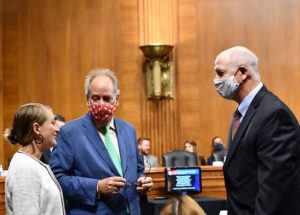From representing recyclers on the rails and seas to engaging with lawmakers and law enforcement, ISRI’s advocacy team has a lot to be proud of in 2021. “We’ve accomplished much in 2021,” says Adina Renee Adler, ISRI’s vice president of advocacy. “And we’re using that momentum to move forward into 2022.”
Across the Oceans and Rails
On April 6, following years of advocating against high demurrage charges and inconsistent rail service, the Surface Transportation Board (STB) issued the Final Rule Establishing Minimum Information Requirements for Class I Demurrage Invoices. The rule mandates rail invoices to include accurate and accessible information so both rail carriers and shippers are on the same page. “This is a huge win for ISRI and for our members,” says Robin Wiener, ISRI’s president.
ISRI has long advocated for relief of the port congestion, shipping, and container issues faced by the recycling industry. In May 2021, the association organized a virtual fly-in where ISRI members met with their members of Congress who serve on the House and Senate transportation committees.
“During those meetings, ISRI highlighted how these issues affect the circular economy and other industries to raise significance and importance of the issue with members of the Hill,” explains David Eaton, ISRI’s director of government relations. The meetings helped pave the way for the House of Representative’s hearing, which, in turn, led to the Ocean Shipping Reform Act of 2021 and its passage through the House on Dec. 8.
ISRI-Led RECYCLE Act Becomes Law
The bipartisan INVEST in America Act passed the Senate in August, the House in November, and was signed into law Nov. 15. The $1 trillion infrastructure bill focuses on improving the nation’s roads and bridges, freight and passenger rail, and communications systems, and investing in environmentally sustainable energy. “The INVEST Act represents a rare opportunity to greatly improve our nation’s physical infrastructure that will lead to lasting improvements as well as help ease the supply chain shortages,” comments Billy Johnson, ISRI’s chief lobbyist.
 Within the bill’s pages sits the ISRI-led bipartisan and bicameral RECYCLE Act that “provides public awareness, education, and much needed clarity for residential recycling programs in the United States,” Johnson says. It authorizes the annual EPA grants program to help educate consumers about residential and community recycling. The goal is to decrease contamination in the recycling stream and support recycling infrastructure.
Within the bill’s pages sits the ISRI-led bipartisan and bicameral RECYCLE Act that “provides public awareness, education, and much needed clarity for residential recycling programs in the United States,” Johnson says. It authorizes the annual EPA grants program to help educate consumers about residential and community recycling. The goal is to decrease contamination in the recycling stream and support recycling infrastructure.
ISRI was instrumental in developing the RECYCLE Act and collaborating with the measure’s sponsor, Sen. Rob Portman of Ohio. He introduced the bill in 2019 and it was introduced to the 117th Congress on March 23. “The idea is to fix the problem before it happens,” Johnson explains. “If the recycler receives good material at the start, then it’s easier to get a higher value and better commodity.”
Spreading the Message “Recycling is Essential”
With the help of ISRI, its members, and state lobbyists, 11 states passed resolutions or similar measures recognizing and commending the recycling industry and its workers. “When policy issues arise, our state advocates and lobbyists need to be able to switch gears quickly to address priority matters, so seeing 11 states adopt this language recognizing our industry is an impressive display of ISRI’s state grassroots,” says Danielle Waterfield, ISRI’s chief policy officer.
Each measure commends the essential role of recycled commodities—including steel, paper, electronics, aluminum, plastics, textiles, tires, and glass—in supplying manufacturers during the pandemic and in their use as feedstock for vital products like hospital gowns, toilet paper, and respirators. It also recognizes recyclers’ role in supplying used auto parts, allowing drivers to access affordable repairs and maintain reliable transportation.
Engaging with Legislators

ISRI members found ways to safely engage with their legislators and discuss the industry. On Tuesday, Sept. 28, ISRI’s Michigan chapter held its annual legislative reception for the first time since the onset of COVID-19. The annual event is instrumental for ISRI members to build relationships with lawmakers and discuss current issues facing the industry.
On the east coast, ISRI’s Pittsburgh and Mid-Atlantic chapters connected with their legislators during the Pennsylvania Day on the Hill, on June 15. Unable to go inside the Pennsylvania Capitol due to COVID-19 restrictions, members hosted a cocktail party for lawmakers nearby. About 60 state representatives and senators attended the event, making it an even greater success than the most recent Day on the Hill in 2019.

Partnering with Law Enforcement
In 2021, ISRI and its members attended law enforcement conferences around the country to discuss materials theft and how to prevent it. These were opportunities for law enforcement agencies to learn more about ISRI, its members, and the recycling industry. In addition, ISRI’s Empire and New York chapters partnered with the New York State Association of Chiefs of Police (NYSACOP) to combat metals theft. ISRI offered information on members’ efforts to address metals theft to NYSACOP members at the NYSACOP annual training conference.
Advocating for Members Nationally and Internationally
Shredder wear parts are the heart of a shredder, keeping it operating all day long. These parts need to be replaced almost daily so having them in bulk supply is vital for U.S. recyclers. For that reason, ISRI has advocated for an exemption to the shredder wear parts tariff since it was first imposed in 2018.
In 2021, before the Biden administration determined how it would handle tariffs levied by the previous administration, ISRI’s advocacy team was already reaching out to staff at the Office of the United States Trade Representative (USTR) on the matter. The association went into overdrive on Oct. 5, when USTR announced it would seek public comments to revive a targeted tariff exclusion process for a list of products that included shredder wear parts. ISRI submitted public comments explaining why the shredder wear parts exclusion should be reinstated and encouraged members to send comments on the importance of reinstating the inclusion to their businesses.
“The advocacy of our members compliments the advocacy of ISRI’s team,” Eaton says. “Our members are the ones who are valued in this [comment] process by the decisionmakers [at USTR], so we appreciate them putting forth the effort to make their voices heard.”
Commerce Grant to Enhance Specifications Circular
In October, the Commerce Department awarded ISRI a $46,000 grant to advance ISRI’s Specifications and the association’s work promoting U.S. exports of recycled materials. The grant will support the association’s comprehensive review of its specs to reflect the current recycled commodity markets and improve accessibility by governments and industry. ISRI will use the finding from the International Trade Administration’s Market Development Cooperator Program to create a new interactive, online specs resource, and support educational outreaching, internationally and domestically, to inform stakeholders about industry standards and best practices.
“The ISRI Specifications are recognized across the world as the global standard for buying and selling a variety of processed recycled commodities,” says Joe Pickard, ISRI chief economist and director of commodities. “This grant will allow us to not only expand our reach, but to also highlight the recycling industry’s role in positively impacting global trade, U.S. job creation, and so much more. We are excited for this award and the work to follow.”
An Active New Year
ISRI’s advocacy team is prepared for an active 2022. On Jan. 18, New Jersey Gov. Phil Murphy signed into law a bill establishing postconsumer recycled content (PCR) requirements for rigid plastic containers; glass containers; paper and plastic carryout bags; and plastic garbage bags. ISRI’s New Jersey Chapter and Plastics Division, represented by Sunil Bagaria, president of GDB International and Plastics Division Chair, and Eadaoin Quinn, director of business development and procurement at EFS‑plastics and Plastics Division Secretary, worked with state Sen. Bob Smith, chair of the Senate’s Environment and Energy Committee, and the New Jersey Department of Environmental Protection to ensure the bill’s recycled-content requirements reflected the concerns of the recycling industry.
With an early win under its belt, ISRI’s advocacy team is ready to take on new opportunities for the industry, guided by the 2022 Advocacy Agenda passed by ISRI’s Board of Directors on Jan. 25.
Body image 1 caption: Photo of Billy Johnson testifying before EPW courtesy of AF&PA. Credit for the photos goes to Clara Cozort. All other images courtesy of ISRI.
Additional Resources













